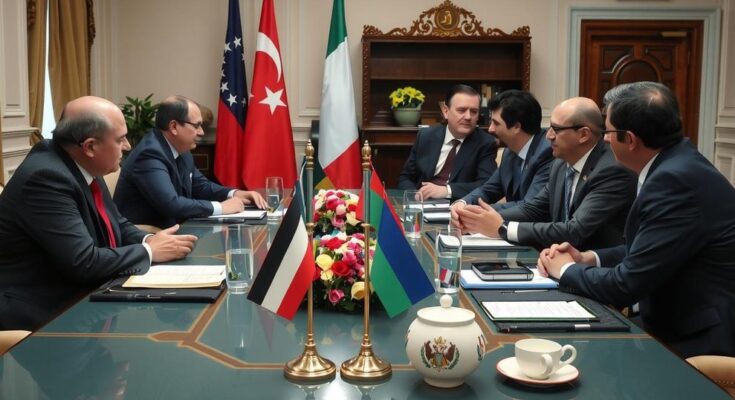German and French Foreign Ministers met Syria’s new rulers to advocate for a peaceful power transition and to signal an emerging relationship post-Assad regime. The ministers emphasized human rights protection and offered support for a new constitution, while condemning past abuses witnessed in Sednaya prison.
On December 8, following the fall of President Bashar Al-Assad’s regime, German Foreign Minister Annalena Baerbock and French Foreign Minister Jean-Noel Barrot visited Syria, marking the inaugural visit by EU officials since the regime’s ousting. The purpose of their meeting with de facto leader Ahmed Al-Sharaa in Damascus was to foster a new diplomatic rapport and advocate for a peaceful transition of power in the nation. The ministers emphasized the necessity of respecting minority rights and civil principles, responding to the political upheaval in Syria.
During their discussions, Minister Kaja Kallas, the EU’s foreign policy chief, articulated the need for protection of all civilians, stating, “Our message to Syria’s new leadership: respecting the principles agreed with regional actors and ensuring the protection of all civilians and minorities is of the utmost importance.” The visit is aimed at communicating a cautious optimism towards the new leadership now in place after years of conflict.
Both ministers condemned the human rights violations experienced under the former regime, particularly during their tour of Sednaya prison, notorious for its history of torture and detainment. Minister Barrot expressed the gravity of the situation stating, “Syria cannot rise above if justice is not served. Therefore, as of today, we are offering the transitional authorities France’s technical expertise to contribute to the struggle against impunity.”
Germany and France indicated their readiness to provide technical advice as Syria prepares a new constitution, recognizing the fragility yet potential for democratic transition in the country. Barrot also proposed involving the Organisation for the Prohibition of Chemical Weapons to evaluate Syria’s chemical weapons stockpile.
Germany and France’s engagement in Syria signals a pivotal shift in international relations following the collapse of the Assad regime. The visit marks a re-establishment of dialogue with the new leadership in the context of a country emerging from a prolonged civil war. Both nations aim to assist Syria in rebuilding its governance structure while advocating for human rights and transitional justice. The historical context includes decades of authoritarian rule that have led to widespread suffering and violations of civil liberties.
The recent visit by the German and French foreign ministers to Syria underscores a significant effort to promote a peaceful political transition and re-establish relationships in the wake of the Assad regime’s downfall. Emphasizing human rights and justice, the EU ministers extended support for Syria as it navigates the complexities of rebuilding and reforming its government. The cautious optimism expressed by the ministers highlights the delicate balance between aiding in recovery and ensuring accountability for past atrocities.
Original Source: www.dailynewsegypt.com



